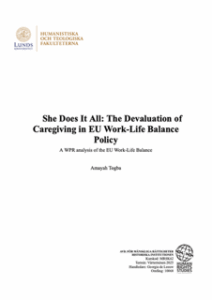She Does It All: The Devaluation of Caregiving in EU Work–Life Balance Policy
28.11.25

Across Europe, mothers carry out vast amounts of unpaid care work that keeps families and societies functioning—yet much of this labour remains largely invisible in EU policy. A new study shared with Make Mothers Matter argues that, despite progress in parental leave and childcare provision, EU work–life balance measures continue to prioritise economic growth over the lived realities of mothers.
 At the centre of the research is a compelling concern: gender equality in the EU is still largely framed as getting more women into the labour market. While this is an important objective, current policy approaches often reduce caregiving to a means of facilitating employment, rather than recognising it as a valuable social contribution in its own right. According to the study, this narrow focus fails to reflect the lived realities of mothers, who perform continuous, skilled, and emotionally demanding work—childrearing, household organisation, and managing the mental load—that sustains families and enables all other social and economic activity.
At the centre of the research is a compelling concern: gender equality in the EU is still largely framed as getting more women into the labour market. While this is an important objective, current policy approaches often reduce caregiving to a means of facilitating employment, rather than recognising it as a valuable social contribution in its own right. According to the study, this narrow focus fails to reflect the lived realities of mothers, who perform continuous, skilled, and emotionally demanding work—childrearing, household organisation, and managing the mental load—that sustains families and enables all other social and economic activity.
The analysis draws on feminist theory and human-rights frameworks to highlight how this focus neglects the profound social value of unpaid care work, which is overwhelmingly carried by mothers. Mothers are often represented in relation to labour market demands rather than as individuals with diverse caregiving responsibilities and rights.
 The thesis underscores that caregiving is not a single, uniform experience. Many mothers face structural constraints, including rigid work cultures, limited access to flexible care options, financial pressures, and a lack of long-term institutional support for the unpaid care they provide. These pressures are particularly acute for single mothers, stay-at-home mothers, and working mothers navigating precarious conditions—groups whose experiences rarely appear in EU-level discussions. Such conditions limit their ability to make truly autonomous choices about work, care, and family life.
The thesis underscores that caregiving is not a single, uniform experience. Many mothers face structural constraints, including rigid work cultures, limited access to flexible care options, financial pressures, and a lack of long-term institutional support for the unpaid care they provide. These pressures are particularly acute for single mothers, stay-at-home mothers, and working mothers navigating precarious conditions—groups whose experiences rarely appear in EU-level discussions. Such conditions limit their ability to make truly autonomous choices about work, care, and family life.
Finally, the study calls for maternal rights that go beyond pregnancy, birth, and post-partum care. It emphasises the need for long-term recognition and support for mothers’ unpaid care work as a “social good essential to society’s functioning“.
The thesis identifies several key problems in current EU approaches:
- Representation of mothers: often tied to labour-market productivity rather than caregiving realities.
- Care and work: care is valued mainly as a tool to support employment, not as a public good.
- Autonomy and choice: constrained by economic pressures and restrictive work structures.
- Rights and institutional support: many entitlements depend on employment status, income or employer discretion.
- Policy silences: intersectional inequalities affecting mothers are frequently overlooked.
As the researcher writes,
“Equality should not only mean equal access to work, pay or parental leave, it should also mean that all individuals, regardless of gender, can make autonomous choices without being limited by structural constraints. Only then can true freedom of choice and real (gender) equality be realised.”
Make Mothers Matter is grateful to Amayah Togba for dedicating her work to such an urgent and under-examined issue, and for choosing to share her findings with us.
Her thesis reinforces what mothers have long known—and what policymakers must finally recognise: caregiving is not a secondary activity but a cornerstone of social and economic wellbeing, and valuing it is essential to achieving genuine equality.
 Amayah Togba is a Human Rights graduate from the Faculty of Humanities and Theology at Lund University, Sweden.
Amayah Togba is a Human Rights graduate from the Faculty of Humanities and Theology at Lund University, Sweden.
Access the full thesis here.
The New EU Gender Equality Roadmap : A Call for Inclusion of Mothers
04.03.25
The European Commission’s initiative on a new Gender Equality Roadmap post-2025, marks a significant step forward in addressing gender disparities across the European Union. Make Mothers Matter (MMM
Breaking the Cycle: Gender Equality as a Path to Better Mental Health
18.03.25
The Council of the European Union has taken a decisive step in recognising the vital connection between gender equality and mental health.
Europe Must Listen to Mothers: Our landmark report heads to the European Parliament
28.08.25
On 22 September 2025, the voices of mothers will take centre stage in Brussels. For the first time, Make Mothers Matter (MMM) will present its State of Motherhood in Europe








